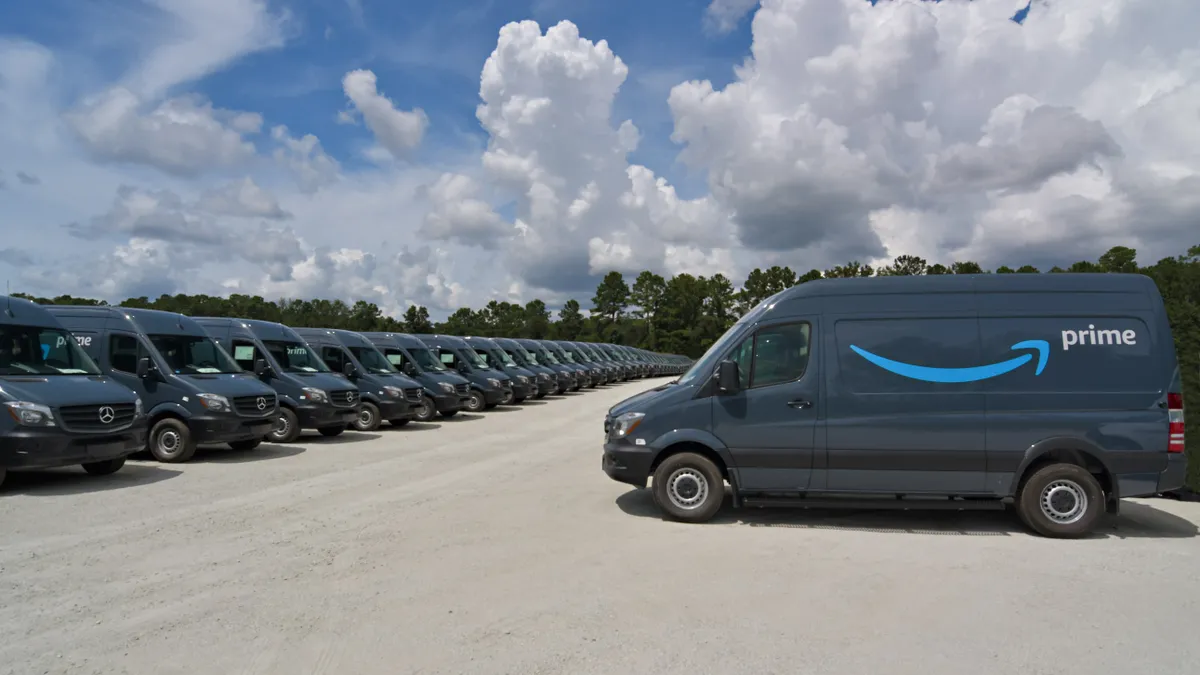Dive Brief:
- Amazon will open 100,000 full- and part-time positions in its fulfillment centers and delivery network as it sees a spike in demand for e-commerce due to quarantines and social distancing during the COVID-19 outbreak.
- In a company blog post, Amazon described its labor requirements as "unprecedented for this time of year," driving the need to significantly increase hiring. Amazon will also increase pay for hourly workers by $2 per hour, but only through April. The Wall Street Journal first reported the news.
- The 100,000 employees Amazon seeks to hire is half the number it hired during last year's peak season — the first peak season in which if offered 1-day shipping for some Prime items. An Amazon spokesperson directed HR Dive sister publication Supply Chain Dive to its blog post when asked if the 100,000 workers would be temporary or permanent. The blog does not clarify this.
Dive Insight:
E-commerce has boomed as consumers worldwide practice social distancing and self-quarantining (by choice or by government mandate), leading e-tailers and marketplaces like Amazon to amp up their supply chains to cope with increased demand.
Amazon faced stock-outs on some household staple items as consumers went into panic-buying mode. "We are working around the clock [to] bring on additional capacity to deliver all of your orders," Amazon said in a statement dated Saturday, according to sister publication Retail Dive. Two days later, Amazon announced its plans to significantly ramp up fulfillment and delivery hiring to execute online orders.
The additional warehouse workers will focus primarily on stocking and shipping of essential goods. "We are temporarily prioritizing household staples, medical supplies, and other important products coming into Amazon fulfillment centers so we can more quickly receive, restock, and ship these products to customers," Amazon said in a blog post Tuesday.
Reuters reported Amazon is suspending its sellers from shipping non-essential goods to warehouses until April 5. Essential categories are baby products, health and household, beauty and personal care, grocery, industrial and scientific, and pet supplies, according to Reuters.
Consumer-facing companies are relying on e-commerce and delivery, and the supply chains behind them, to keep business going. Several states have barred restaurants from serving customers in their dining rooms.
"With empty dining rooms, restaurants are depending on pickup and delivery orders more than ever," Grubhub Founder and CEO Matt Maloney wrote in an email to users.
"We're actually part of the solution," said Frank Hurst, president of Roadrunner Freight, referring to supply chains and logistics companies during this time of crisis. "We're delivering groceries and we're delivering home improvement items and all those things that the general public needs," he told Supply Chain Dive.
But the uptick in demand for freight and logistics to execute e-commerce deliveries is most likely temporary, Kyle Lintner, principal and managing director at K-Ratio, told Supply Chain Dive. "It would be short-sighted to say this is going to continue," he said. The spreading outbreak of coronavirus could have long-lasting economic implications, and as a result, reduce consumer demand from a finished-goods standpoint, thereby reducing freight demand as well, he said.















